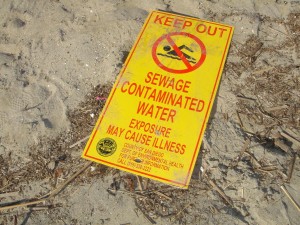
Mission Beach is closed when waters are contaminated.
Photo: San Diego Earthworks
It is important to understand the condition of California’s coastal waters has degraded over time. With the inception of state-wide water quality testing standards and public disclosure laws, California is now able to accurately measure and fully disclose the condition of recreational waters to residents. And, with the data gathered from testing, municipalities and other agencies are working hard to develop long-term collaborative strategies to minimize the impacts of urbanization on our beaches, bays and watersheds.
Our beaches and bays, including Mission Bay, continue to have intermittent closures as a result of pollutant levels that are too high. The County of San Diego’s Department of Environmental Health Beach and Bay Monitoring Program provides updates on the status of beach closures throughout San Diego County. You can view their daily Beach and Bay Status Report on their webpage or call their hotline at (619) 338-2073 for the current status. San Diego Coastkeeper also conducts regular water quality monitoring throughout the county. Click here for information on their program or to volunteer .
The City of San Diego is primarily responsible for assuring the quality of water of the Rose Creek Watershed. Urban runoff in the storm drain system within the Rose Creek Watershed is characterized as containing some pollutants at measurable levels; pollutants that are commonly found in urban runoff throughout the region.
Review of the storm drain system monitoring data indicates there are elevated levels of total suspended solids (dirt), pesticides, oil and grease and bacteria. These same pollutants are commonly found in urban runoff across the City and region. The City’s Storm Water Pollution Prevention Program is performing visual observations and field screening monitoring at 24 sampling stations around the watershed.
The purpose of this monitoring is to detect and eliminate illicit connections and illegal discharges into the storm drain system. When tests reveal elevated levels of pollutants, follow up investigations are conducted as soon as possible to identify the source of pollution. Once the source is found, monitoring staff coordinate with the Storm Water Code Enforcement to eliminate the source so that they do not continued to contribute to lower water quality in Rose Creek. The monitoring data is evaluated annually to compare water quality data between the Rose Creek and other watersheds in the City and across the county. This assessment is included in the City of San Diego’s annual Municipal Storm Water Permit report to the San Diego Regional Water Quality Control Board. For more information about the city’s program to improve water quality please visit Think Blue San Diego. .
Our thanks to Ruth Kolb of the City of San Diego Water Department, KTU&A, the County of San Diego, Department of Environmental Health and the Regional Water Quality Control Board for their help with the information in this section.
